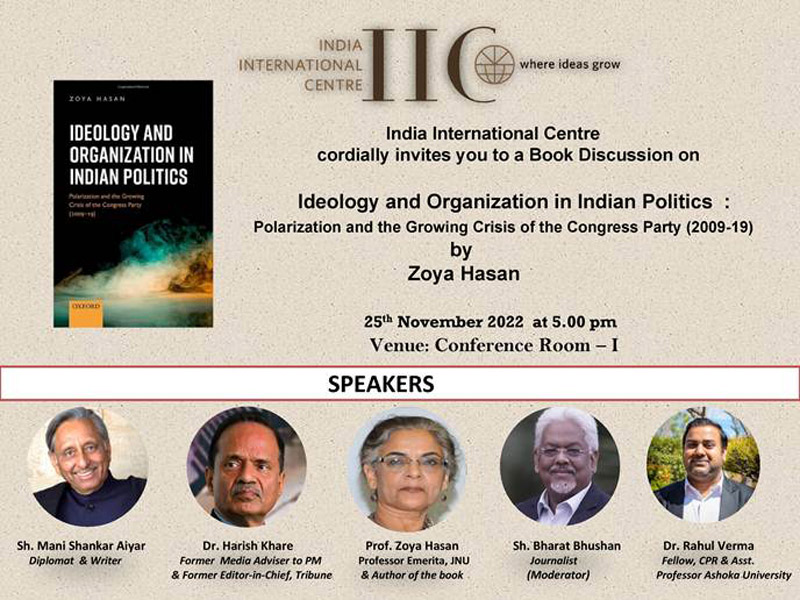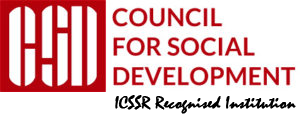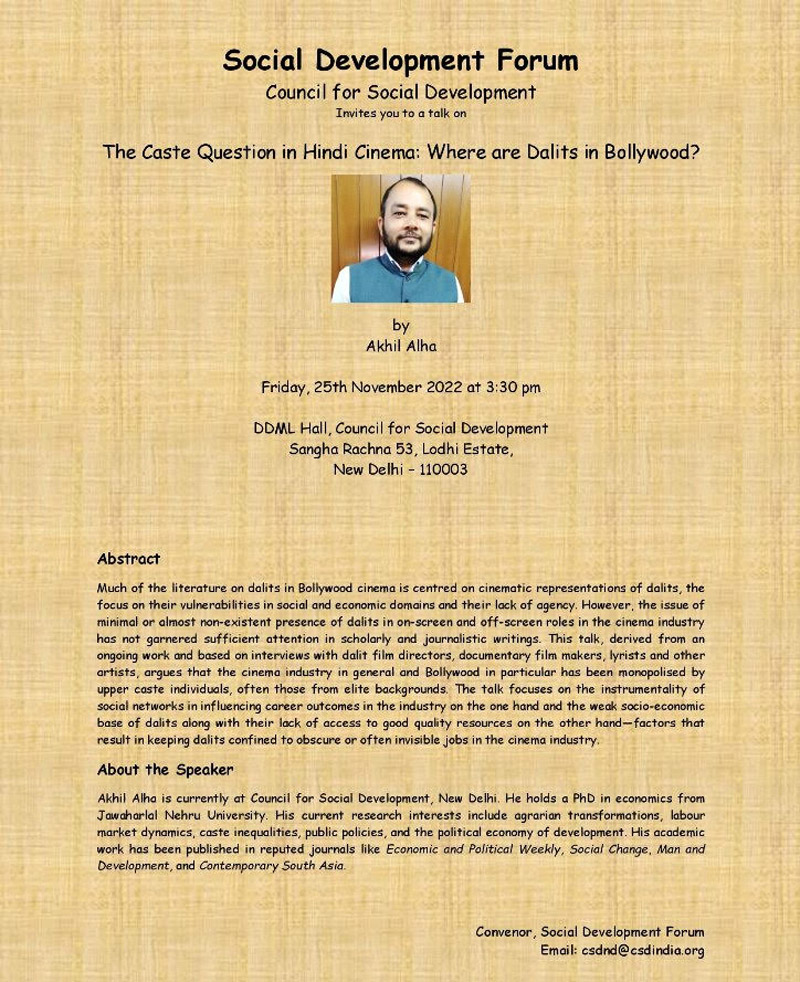Book Discussion Programme on “Ideology and Organization in Indian Politics” by Zoya Hasan on 25th November 2022

Ideology and Organization in Indian Politics:
Polarization and the Growing Crisis of the Congress Party (2009-19)
by
Zoya Hasan
25th November 2022 at 5.00 pm
Venue: Conference Room – I
About the book : Ideology and Organization in Indian politics examines the immense changes that have occurred in Indian politics over the past decade and its impact on the Indian National Congress. The impact is most apparent in the changing fortunes of the Congress party, which suffered two major defeats in 2014 and 2019 elections, bringing the party’s crisis to the front and centre of public debate. This book seeks to understand the reasons for these enormous changes by looking first at the underlying conditions that led to the decline of the Congress and second the challenges – both external and internal-confronting the Congress and, while doing so, estimating its impact on Indian politics and on the Congress.
Speakers :
Sh. Mani Shankar Aiyar, Diplomat & Writer
Dr. Harish Khare, Former Media Advisor to PM & Former Editor-in-Chief, Tribune
Sh. Bharat Bhushan, Journalist (Moderator)
Dr. Rahul Verma, Fellow, Centre for Policy Research & Assistant Professor, Ashoka University
Prof. Zoya Hasan, Professor Emerita, Jawaharlal Nehru University & Author of the Book.
Please make a note
- Physical programmes will be held as per the Covid -19 guidelines.
- Wearing of face masks is mandatory and will be strictly enforced. Entry will not be permitted to anyone not wearing a mask.
- The Audience are requested to arrive at the venues, at least 10 minutes prior to the programmes in order to facilitate the screening process at the Door.
- Seating will be on the first come basis.
We request audiences to kindly abide by the above regulations
Workshop on Capacity Building for Resettlement and Rehabilitation of Project Displaced People
Rescheduling of the Workshop on Capacity Building
for Resettlement and Rehabilitation of Project Displaced People
February 27-28, 2023
At
India International Centre, New Delhi
Objectives:
- to familiarize the participants with the complex issues surrounding land acquisition and resettlement
- to develop among them ability to do Social Impact Assessment and resettlement planning
- to enhance implementation and monitoring skills.
Participants:
- senior/middle level government officials,
- industry managers,
- NGOs,
- academics, and
- those working on internationally-funded projects.
Course Contents:
- Land Acquisition Law and Rehabilitation Policy: A Historical Perspective
- Land Rehabilitation and Resettlement Act 2013: Background, Context and Implementation
- Social Impact Assessment
- Environmental Impact Assessment
- Tribal and Gender Issues in Resettlement Projects
- Social Movements against Displacements
- Resettlement and Rehabilitation: Case Studies
- Relocation and Resettlement in Urban Areas
- Best Practices in Resettlement & Rehabilitation
Course Contribution:
Revised Contributory Fee: INR 5,000;
Concessional Rates for Students and NGOs: INR 3,000
Need-based modest accommodation will be provided to a limited number of outstation participants.
Last date for receiving application/nominations is 5 February 2023.
For further information, please contact
Dr Nivedita Sharma
Assistant Professor
Council for Social Development, Delhi
Phone: 011-24692655/234
Email: nivedita@csdindia.org
Qualitative methods in Social Sciences: Ethnography, Narratives and Social Stories
Council for Social Development, New Delhi,
and G B Pant Social Science Institute, Prayagraj, A Constituent Institute of Allahabad University
Invite application for one week programme on
Qualitative Methods in Social Sciences: Ethnography, Narratives and Social Stories
(28 November to 02 December 2022)
Last Date of Application: 25 November 2022
Addendum
The date of submission has been extended upto 25th November.
A provision has been made for online participation for a limited number of candidates. Those who have difficulty in participating in OFFLINE mode may apply for online participation
Duration: One Week
Venue: Council for Social Development, New Delhi
Registration Form: click here
Eligible participants: Students/ researchers/ faculty members in research institutions/ universities/ colleges, development professionals and government officers.
Course contents: Understanding specificities of Indian society; different methods of qualitative research; selecting the field; the question of outsider and insider; selection of respondents; family tree and biographical notes of respondents; retrieving the memories; semi structured and un-structured interviews (Baat-se-baat methodology); focused group discussions (FGDs) to validate the facts and fill in the incomplete stories; capturing the silence, murmuring, half sentences; inclusion of left out resources (proverbs, folk stories and songs); content analysis and discourse analysis; visual representation of qualitative data; writing social stories
Course contribution: Rs. 6000/- (inclusive of kit bag, course material, lunch & refreshments)
Payment through online transfer/Crossed Cheque/ DD in favour of Council for Social Development, payable at Delhi or NEFT (A/c no. 600720100050048, Bank of India, IFSC Code BKID0006007)
Application details: www.csdindia.org / http://www.gbpssi.in/
Contact: Dr. Archana Singh: archanaparihar@gmail.com
Ms Jaya Lekshmi Nair: jaya@csdindia.org
Objectives
This workshop aims at providing a perspective on social science research on the Indian society that has been dominated by borrowed concept from western theories and practices, which if not applied carefully, often miss out the nuances of plurality, saliences of diversity and other unique features of the Indian society. This workshop is focused on qualitative methods and intends to provide a perspective on qualitative research in India’s context. It aims at imparting training on the practical aspects of application of various qualitative methods and expose the participants towards the limitations of blind application of text book knowledge to the field, especially in India’s settings.
Training Modules
1: Understanding qualitative research and Specificities of Indian society
2: Preparing the researcher for qualitative research and introducing different methods
3: Selecting the field: deconstructing the debate of own society vs. others societies
4: Relating with field: blurring the boundaries of outsider and insider
5: Field research: selection of respondents; family tree and biographical notes of respondents; retrieving the memories; semi structured and un-structured interviews (Baat-se-baat methodology); focused group discussions (FGDs) to validate the facts and fill in the incomplete stories; field diary, notes and queries of observations; capturing the silence, murmuring, half sentences
6: Data analysis: transcription; reading the field notes; inclusion of left out resources (proverbs, folk stories and songs); content analysis and discourse analysis; understanding the caste-orality
7: Visual representation of qualitative data
8: How to write social stories

